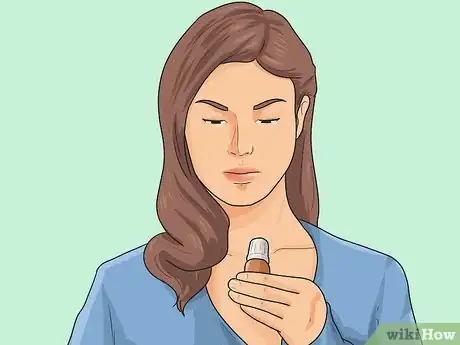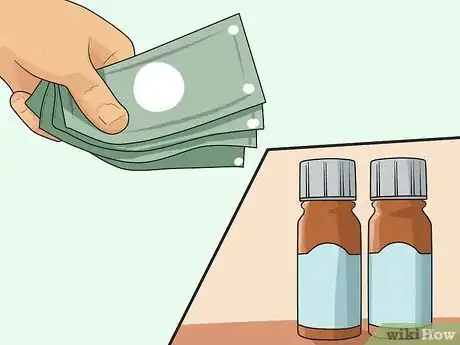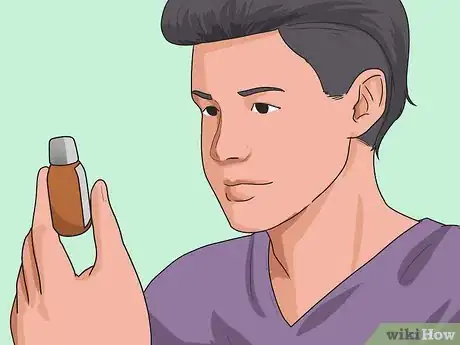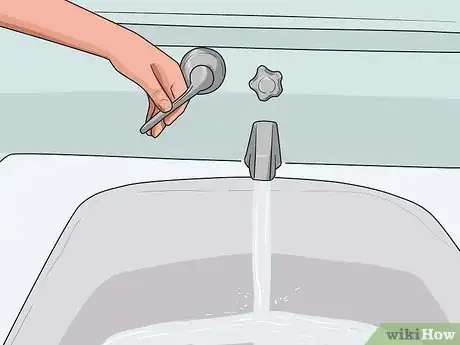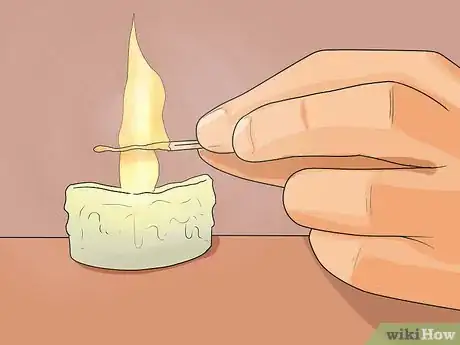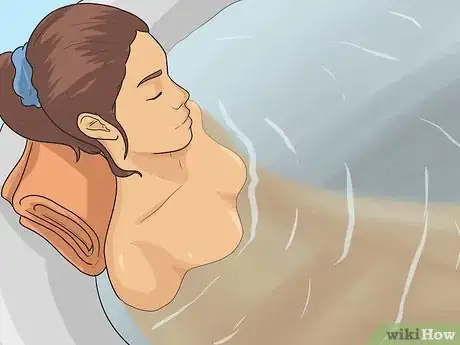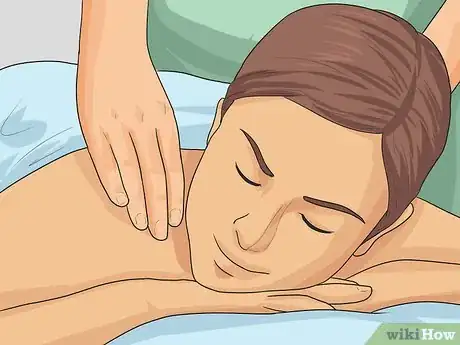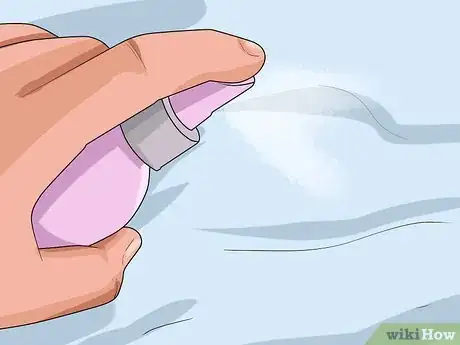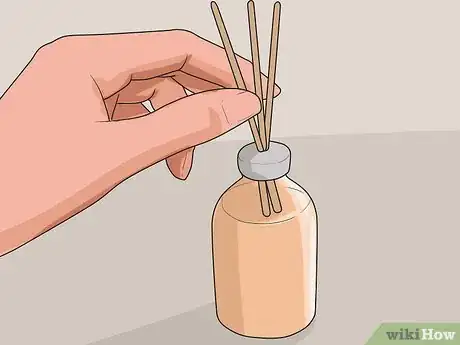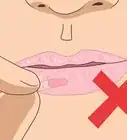wikiHow is a “wiki,” similar to Wikipedia, which means that many of our articles are co-written by multiple authors. To create this article, 16 people, some anonymous, worked to edit and improve it over time.
There are 13 references cited in this article, which can be found at the bottom of the page.
wikiHow marks an article as reader-approved once it receives enough positive feedback. In this case, 89% of readers who voted found the article helpful, earning it our reader-approved status.
This article has been viewed 192,369 times.
Getting a good night’s sleep is one of the most important parts of any person’s day, since it is essential for your health and wellbeing. But in today’s hectic world, many people have difficulty falling and staying asleep. There are many different ways that people can relieve their insomnia, and using essential oils is one natural and simple method that may help you sleep better.
Steps
Finding the Right Essential Oil for Sleeping
-
1Understand how essential oils aid sleep. Using essential oils will not cure your insomnia or the root cause of it.[1] However, essential oils can help you calm down and relax before bedtime and may help you fall and stay asleep.[2]
- Essential oils are distilled from the leaves, stems, flowers, bark, or roots of a specific plant. They are highly concentrated and you won’t need to use much to reap their benefits.[3]
- If you have insomnia for a longer period of time, see your doctor to rule out a more serious condition.
-
2Know the best essential oils to aid sleep. Each essential oil has a different effect on the body and mind. Learning about the different essential oils will help you identify which ones may help you sleep.
- Chamomile essential oil is a powerful calming agent. It can also help lift mood and aid depression.[4]
- Lavender essential oil is an excellent choice to relieve stress, but can also be used as an anti-depressant, and sedative.[5]
- Marjoram essential oil can help ease anxiety and stress, fight fatigue.[6]
- Valerian essential oil can help relax and calm you and may aid occasional insomnia.[7]
- Vetiver essential oil can help relax and calm you and may help you fall and stay asleep.[8]
-
3Buy an essential oil that will aid your sleep. Once you’ve identified the essential oils that may help you sleep, buy one that you like and a carrier oil. You can buy essential and carrier oils at many stores and online retailers.
- Consider buying several different essential oils to aid your sleep. That way, you can choose a scent you like best on any given day.
- Because essential oils are so concentrated, you’ll need to dilute it with a carrier oil to best use it. Some examples of carrier oils are: sweet almond oil, apricot kernel oil, avocado oil, olive oil, and sesame oil.[9]
- You can buy essential oils and carrier oils at most health food or nutritional supplements retailers either online or in the store.
-
4Read the label. Because each essential oil has different properties and may not be ideal for all users, it’s important to read the label of any essential oil before you use it. It’s also a good idea to do a skin patch test before using an oil.
- You can find out about the oil’s contra-indications by reading the label. For example, you wouldn’t want to use valerian if you are pregnant or breastfeeding.[10]
- Before you use the essential oil in a bath or for a massage, do a skin patch test. Add 1-2 drops of diluted essential oil to the inside of your elbow. If no irritation occurs after 24 hours, then you can safely use it on your skin.[11]
Taking a Bath with Essential Oils for Sleep
-
1Mix your essential oil. Choose an essential oil that will help you relax and mix it with a carrier oil.
- The best mixture is about 7-12 drops of essential oil to each fluid ounce of carrier oil, depending on how strong you want the aroma.[12]
-
2Run your bathwater and add your essential oil. Fill your bathtub with the water and your essential oil. As the water runs, add the essential oil to get the best distribution.
- Add your essential oil to the running water to distribute it through the bathwater.
- Make sure that the water isn’t too hot so that you don’t burn your skin. Use a thermometer to check for optimal water temperatures for anyone. The optimal temperature for any person for a bath is between 37 and 39 degrees Celsius.[13]
-
3Set a comfortable and relaxing mood. In order to relax and induce sleep, make your bathroom as comfortable and relaxing as possible. Consider using music, bath props, and candles.
- Aromatherapy candles and scent lamps are a great way to reinforce the properties of your essential oil bath. In addition, their soft light will help to further relax you.[14] Both are widely available at major retailers and online.
- Dim the lights in the bathroom, but don’t turn them off completely unless you’re using candles.
- Soft music can help set the mood for you to relax and reinvigorate yourself.
-
4Take your bath. Enjoy your aromatherapy bath! Soaking for just the right amount of time will ensure that you get the most benefits from the essential oil to help you sleep.
- Soak for about 15-20 minutes to get the most benefits. Staying in longer can dry out or damage your skin.[15]
- Consider using bath props, such as a pillow or rose petals, to help you relax further.
- A warm washcloth over your eyes will also help you enjoy your bath. Just make sure to warm it in water under the faucet so that you don’t get any essential oil in your eyes.
- Don’t drink any of the bathwater or get it in your eyes.
- Wrap yourself in a towel to keep yourself warm and seal in moisture until you can apply moisturizer to your skin.
Using Essential Oils Topically for Sleep
-
1Give yourself a massage with essential oils. Giving yourself a gentle massage with essential oils before bed will help relax you and relieve tension. Applying some essential oil to places such as your feet and temples can have a similarly calming effect. By applying these essential oils your body, you may help yourself fall asleep more quickly.
- If you are using essential oil for a massage, make sure to mix it with a carrier oil so you don’t burn your skin.[16]
- Make sure to keep the massage light or else you’ll stimulate your circulation and have a hard time falling and staying asleep.[17]
- Consider massaging the essential oil into your wrists, feet, legs, or on your temples.[18]
-
2Spritz essential oil on bed linens. If you don’t want to put essential oil on your skin because it is sensitive, spritz it on your bed linens. The scent will help you relax and may help induce sleep.
- Make your spritzer by adding 30-40 drops of your favorite essential oil for sleep to 1.5 ounces of distilled water. Mix these in a clean spray bottle.[19]
- The number of drops of essential oil you use will depend on how strong you want the scent to be.[20]
- You only need to lightly mist your bed linens. Dousing them could make for an uncomfortable night’s sleep.
-
3Use candles or scent diffusers. Candles made from essential oils and scent diffusers that heat essential oil can have the same calming effect as a bath or a massage. Don’t leave them burning so that you don’t accidentally start a fire.
- You can buy candles and scent diffusers at most retail stores and online.
- When buying candles, it’s important to look for ones without synthetic fragrance. Beeswax, soy, and other vegetable-based waxes are the best option for getting the benefits of an essential oil by candle.[21]
- Scent diffusers disperse the essential oil through the air in a room, filling it with the aroma.
- For the best use, light candles or scent diffusers an hour to 30 minutes before you go to bed. This will ensure that the scent circulates in your bedroom and creates a relaxing environment to help you sleep.
- Make sure to extinguish candles and scent diffusers before you go to bed so that you don’t start a fire.
References
- ↑ http://www.aromaweb.com/articles/aromatherapyandinsomnia.asp
- ↑ http://www.aromaweb.com/articles/aromatherapyandinsomnia.asp
- ↑ http://www.aromaweb.com/articles/whatare.asp
- ↑ http://www.aromatherapy.com/most_popular.html
- ↑ http://www.aromatherapy.com/most_popular.html
- ↑ http://www.aromatherapy.com/most_popular.html
- ↑ http://www.experience-essential-oils.com/valerian-root.html
- ↑ http://www.experience-essential-oils.com/valerian-root.html
- ↑ http://www.aromaweb.com/articles/whatcarr.asp
- ↑ http://ods.od.nih.gov/factsheets/Valerian-HealthProfessional/
- ↑ http://www.aromaweb.com/articles/essential-oil-skin-patch-test.asp
- ↑ http://www.aromaweb.com/articles/dilutingessentialoils.asp
- ↑ http://www.telegraph.co.uk/news/health/3318578/So-Mr-Prescott-how-hot-should-my-bath-be.html
- ↑ http://www.aromaweb.com/articles/diffu.asp
- ↑ http://www.dailymail.co.uk/health/article-156070/The-good-bath-guide.html
- ↑ http://www.aromaweb.com/articles/whatcarr.asp
- ↑ http://www.aromaweb.com/articles/aromatherapyandinsomnia.asp
- ↑ http://www.aromaweb.com/articles/aromatherapyandinsomnia.asp
- ↑ http://www.aromaweb.com/recipes/ralinen.asp
- ↑ http://www.aromaweb.com/recipes/ralinen.asp
- ↑ http://www.aromaweb.com/articles/aromatherapycandles.asp
